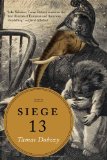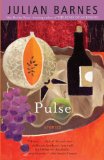Summary | Excerpt | Reviews | Beyond the book | Read-Alikes | Genres & Themes | Author Bio

There is something for everyone here - at least, everyone who loves short stories. Belgian author Peter Terrin writes about a future where, rather than restricting birth rates, the government allows each citizen a few murders, no questions asked. Meanwhile, Bulgarian Georgi Gospodinov writes of a future where one must chose when to die, because it won't happen naturally. The Sky over Thingvellir is a sweetly powerful story of deflected emotions and difficult breakups, while The Orphan and the Mob is a witty, murderous satire full of clichés put to outrageous use. Stories of displaced peoples in the aftermath of war, rivalries between father and son, soccer, estranged families, infidelity, lost love, and even a story in verse (written by a Scotsman, naturally). On second thought - maybe those who look for joyful characters and happy endings should give this collection a pass.
Many short story collections are planned around a theme - same author, subject or place, perhaps - and this one suffers a little from the disparate nature of the stories involved. I liked most of the stories, and was really impressed by others - but the lack of cohesiveness made it difficult to commit to reading the book through. There was no mystery waiting to be solved or landscape to be further explored, so I would put the book down and have no desire to pick it up for days. That being said, I often turned the page in disappointment at reaching the end of a particular story. For those of us not lucky enough to visit Europe ourselves, or not ambitious enough to read in more than one language, this collection is a chaotic, exciting glimpse into the reading pleasures of the Continent.
The editor, Aleksandar Hemon, bemoans the lack of works in translation available in the U.S. (one of the motivating factors for this volume) and he probably has a point - the only author I recognized was Zadie Smith (an English author), who wrote the short preface. The volume includes biographies and personal statements from the authors, as well as translator biographies and online resources for additional European fiction, should this collection peak your interest.
One of my favorite stories is Carlo Doesn't Know How to Read by Giulio Mozzi of Italy. Carlo is a man who says he cannot read - all he remembers from books are the pictures in his head. When he tells others of the books he reads, he speaks as if they are dreams or true experiences from his life. He remembers details that others don't remember reading - indeed, details that authors don't remember including. This story contains the best description I've read of the experience of living inside the stories we read, while pretending to be the story of a man who seems to have some kind of impairment. For this story alone, the book is worth picking up.
If you like short fiction, cultural oddities, contemporary literature or surprising techniques, you'll find something to love in this collection.
![]() This review
first ran in the May 5, 2010
issue of BookBrowse Recommends.
This review
first ran in the May 5, 2010
issue of BookBrowse Recommends.

If you liked Best European Fiction 2010, try these:

by Tamas Dobozy
Published 2013
From celebrated short-story writer Tamas Dobozy, Siege 13 is a powerful testament to war's ability to carefully and thoroughly decimate the human spirit.

by Julian Barnes
Published 2012
After the best-selling Arthur & George and Nothing to Be Frightened Of, Julian Barnes returns with fourteen stories about longing and loss, friendship and love, whose mysterious natures he examines with his trademark wit and observant eye.
Your guide toexceptional books
BookBrowse seeks out and recommends the best in contemporary fiction and nonfiction—books that not only engage and entertain but also deepen our understanding of ourselves and the world around us.